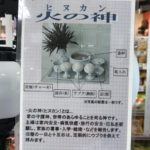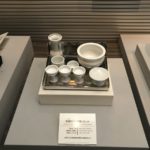ヒヌカン (also seen as ヒーヌカン) Hinukan is the Okinawan word, would be hinokami 火の神 Japanese. 火 is the kanji for “fire” and 神 is the kanji for “god.”
Traditional Ryukyuan cultural believed that a fire god lives in the cooking stove (hearth) of every house or kitchen, to protect a house and its family from evil spirits.
In traditional kitchens, a small altar is set up and maintained by the oldest woman in the household, sometimes on a shelf, a window sill or in a corner. This is a tradition which is dying out, but some still continue today (I was first told of this by an older woman I teach English conversation to, as she has one in her kitchen). The ceramic censer (incense burner) is put in the kitchen along with a plant, salt, water, awamori or sake, and rice in different containers.
It is the oldest woman’s duty to report the events of family life to the hinukan and pray for family happiness and good health. Everyday, the hinukan is given a glass of water in the morning and cleaned regularly. Also, on the 1st and 15th of every month according to the lunar calendar, there is a small ritual to give the hinukan awamori, rice, and burn incense in prayer. During the Spring and Autumn equinoctial week, some additional offerings are usually included. The SanA grocery store already has an advertisement out for pre-orders of party platters for Shuubun 秋分の日 (秋彼岸 akihigan, or 秋のお彼岸 aki no ohigan, Autumn equinox week).
The idea of a hinukan hearth god amuses me, and reminds me of Calcifer in Howl’s Moving Castle. Somehow it seems very cute.
Below is a picture of the set-up explanation that I saw at the SanA grocery store.


4 thoughts on “Hinukan, fire god: ヒヌカン (火の神)”